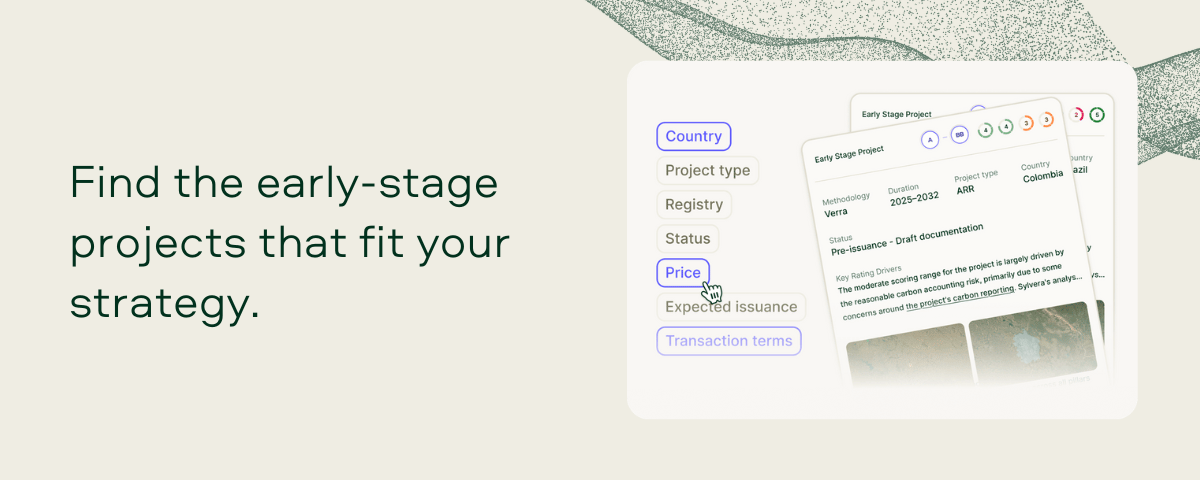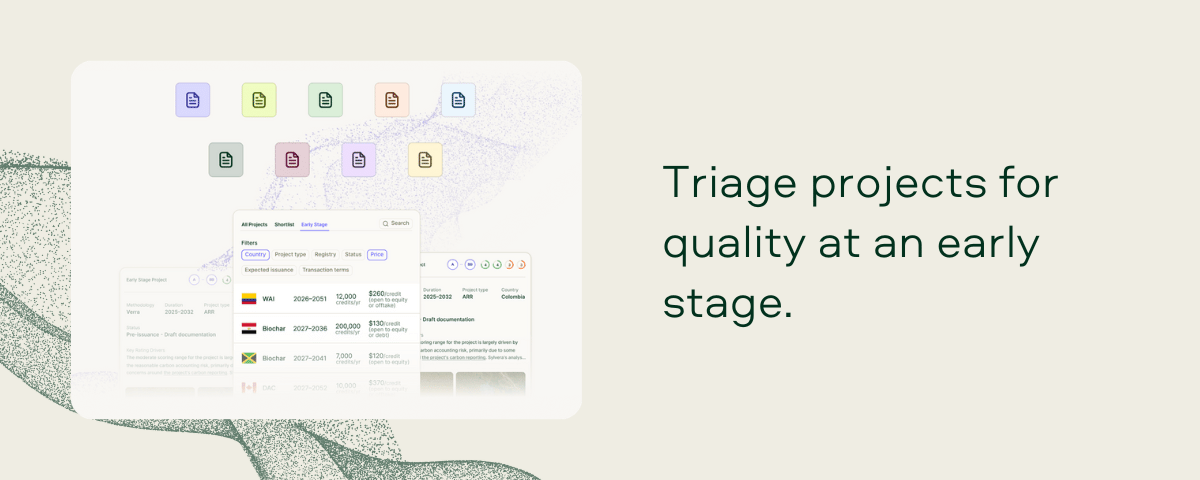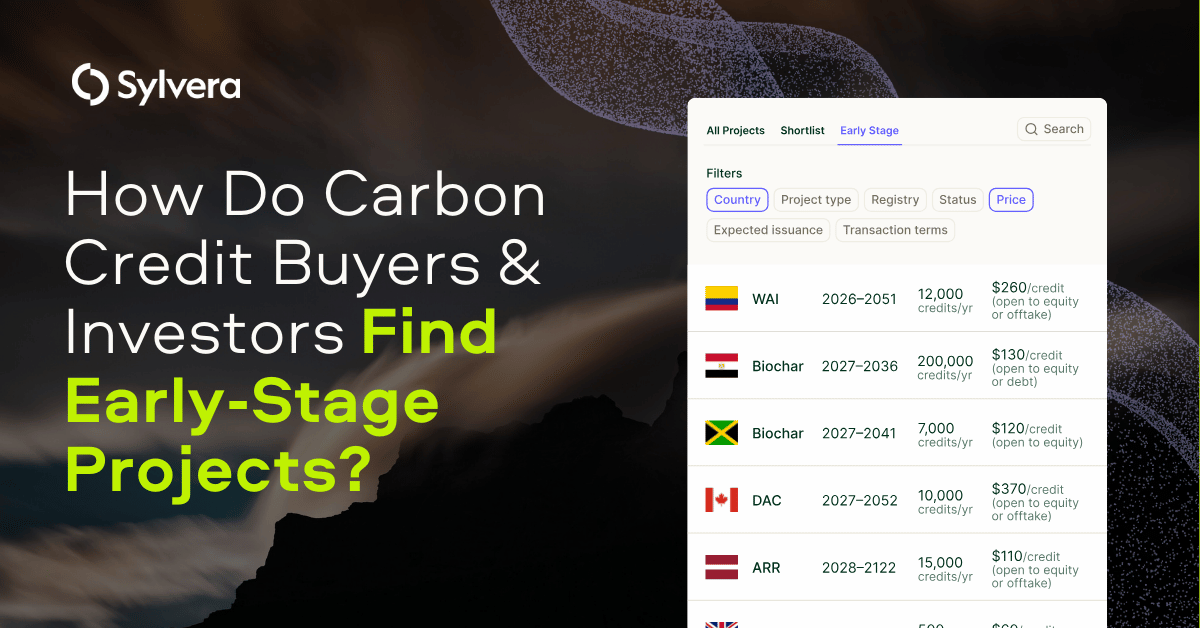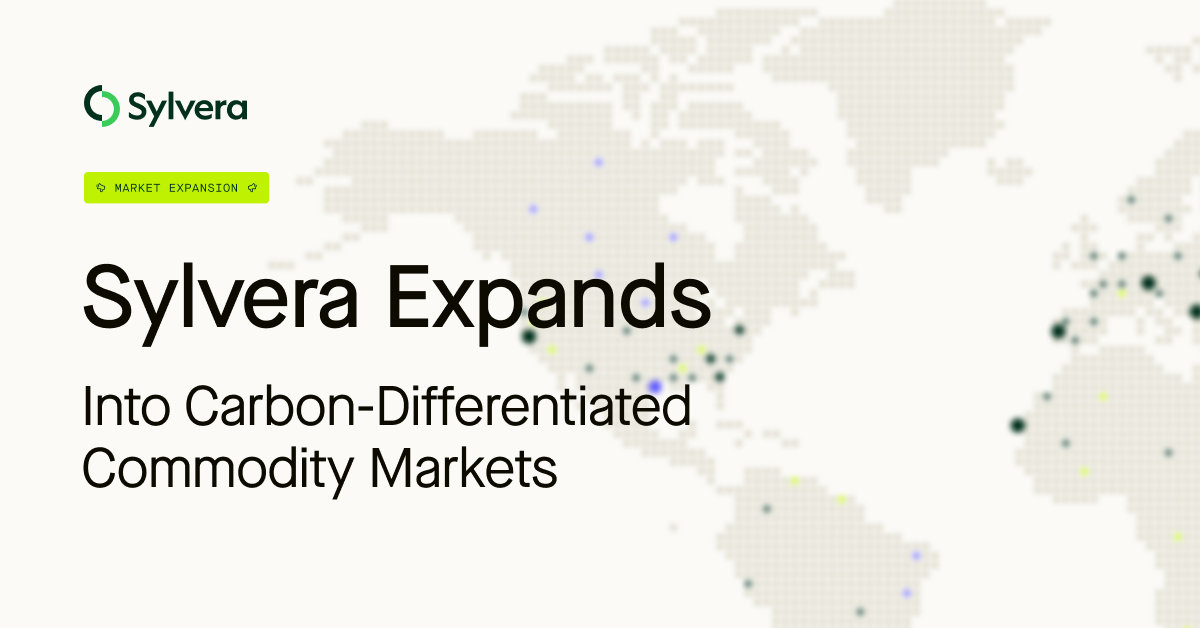“Over the years we’ve invested significantly in our field data team - focusing on producing trusted ratings. While this ensures the accuracy of our Ratings, it doesn’t allow the scale across the thousands of projects that buyers are considering.”
For more information on carbon credit procurement trends, read our "Key Takeaways for 2025" article. We share five, data-backed tips to improve your procurement strategy.

One more thing: Connect to Supply customers also get access to the rest of Sylvera's tools. That means you can easily see project ratings and evaluate an individual project's strengths, procure quality carbon credits, and even monitor project activity (particularly if you’ve invested at the pre-issuance stage.)
Book a free demo of Sylvera to see our platform's procurement and reporting features in action.
The carbon market is moving upstream. Corporate buyers and climate investors are no longer content to wait for credits to be issued before making procurement decisions.
Instead, they're increasingly seeking early-stage investment opportunities that allow them to secure future supply, capture better pricing, and shape the development of high-integrity projects from the ground up.
But finding quality early-stage carbon projects - also known as pre-issuance or ex-ante - is fundamentally different from finding issued credits. Unlike the established registries that list issued credits, there's no centralized marketplace for pre-issuance opportunities.
This creates a fragmented landscape where buyers must navigate countless individual relationships, scattered information, and significant uncertainty about project quality. And all while competing for access to the most promising early-stage projects.
That’s why we’ve introduced Sylvera’s Early Stage Catalog - part of our wider Pre-Issuance solution - to simplify and speed up how buyers and investors find early-stage projects.
The traditional approach to finding early-stage carbon projects
Most carbon credit buyers and investors would previously find early-stage projects through a patchwork of approaches, each with significant limitations.
Direct outreach to project developers requires extensive networking and often yields incomplete information.
Industry conferences and events provide networking opportunities but offer limited systematic coverage of available projects.
Broker and intermediary relationships can provide access but often come with added costs and potential conflicts of interest.
The most common approach involves engaging with multiple project developers individually, requesting information through separate processes for each potential opportunity. This means buyers must complete numerous individual RFIs, each with different formats and requirements, making it difficult to compare opportunities systematically.
This fragmented approach creates several problems for buyers. The process is time-consuming in identifying, evaluating, and comparing projects across different developers and regions. There's also limited visibility or documentation around the available opportunities, meaning buyers may miss promising projects simply because they don't know they exist.
And - perhaps most importantly - there's often insufficient data to assess pre-issuance project quality or and triage potential investments at this stage.
Why early-stage carbon project investment matters right now
The shift toward early-stage investment isn't just about getting better prices, though cost advantages are certainly part of the appeal.
Securing quality carbon credit supply
Corporate sustainability teams are under increasing pressure to secure reliable, high-quality carbon credits to meet ambitious net-zero commitments. Waiting until credits are issued often means competing for limited supply of the highest-quality projects, potentially compromising on either price or integrity.
Ensuring and improving integrity at an early stage
Early-stage investment also allows buyers to influence project development in ways that align with their specific requirements and values. By engaging with developers during the planning and development phases, buyers can help ensure projects meet their quality standards, timeline requirements, and co-benefit priorities.
Financing project development
And, for investors, early-stage carbon projects represent a way to deploy capital toward climate solutions while potentially generating attractive returns. These investments can take multiple forms — from advance purchase agreements that secure future credits at favorable pricing to equity investments in project development companies or debt financing that enables project construction.
Want to understand early-stage carbon projects? Our Pre-Issuance Primer has the key info you need to know.

Introducing a better way of finding early-stage projects: Sylvera’s Early Stage Catalog
Sylvera's Early Stage Catalog fundamentally changes how buyers and investors discover and triage early-stage carbon project opportunities.
Rather than navigating a fragmented landscape of individual developer relationships, the platform provides one single point of access to over 250 early-stage projects from more than 200 suppliers and developers.
The catalog addresses the inefficiencies of traditional early-stage project discovery by pulling opportunities into one searchable platform. Buyers can use advanced filtering options to identify projects that match their specific investment criteria, including transaction terms, pricing expectations, geographic preferences, and expected issuance timelines.
This saves buyers and investors significant time and complexity that would otherwise be spent on outreach and information gathering. Instead of managing relationships with dozens of individual developers, you can efficiently evaluate opportunities across the entire landscape of early-stage projects.

How to triage projects for quality at an early stage
While centralized discovery solves the visibility problem, it doesn't address the fundamental challenge of assessing project quality before credits are issued. This is where Sylvera's Estimated Ratings capability becomes crucial for early-stage decision-making.
Estimated Ratings - available within the Early Stage Catalog - apply Sylvera's analytical frameworks to pre-issuance projects, providing quality signals based on the same scientific principles that drive our renowned post-issuance ratings.
They evaluate projects across the same four pillars that define Sylvera's comprehensive ratings: Carbon Accounting, Additionality, Permanence, and Co-Benefits.
Estimated Ratings are presented as ranges rather than definitive scores, reflecting the inherent uncertainty in pre-issuance assessment. For example, a project might receive an Estimated Rating of A-BB, indicating that based on available information, the project is likely to receive a rating somewhere in that range once credits are issued and a full assessment is completed.
Use cases: Early-stage project discovery and due diligence
Advance purchase agreements and ERPAs: Corporate buyers can use the Early Stage Catalog to identify projects suitable for Emission Reductions Payment Agreements (ERPAs) or other advance purchase arrangements. Estimated Ratings provide the quality assurance needed to commit capital to projects before credits are issued, helping buyers secure future supply from credible developers.
Portfolio diversification and risk management: Investors building diverse carbon credit portfolios can use the catalog to identify opportunities across different project types, geographies, and development timelines. Estimated Ratings help quantify quality-related risks, enabling more informed portfolio construction decisions.
Strategic supplier development: Larger buyers with significant carbon credit needs can use the catalog to identify and build relationships with promising developers early in the project lifecycle. This approach allows buyers to influence project development while securing preferred access to future supply.

Simplifying early-stage carbon investment
As the voluntary carbon market matures, the ability to identify and evaluate opportunities before credits are issued becomes increasingly important for all market participants.
For corporate buyers, early-stage investment capabilities are becoming essential for meeting ambitious climate commitments while managing costs and quality risks. For investors, pre-issuance opportunities represent a growing asset class that combines financial returns with measurable climate impact.
By providing a single place for discovery and credible quality intelligence for early-stage projects, Sylvera is helping build the market infrastructure necessary to channel more capital toward high-integrity climate solutions.
If you’d like to see the Early Stage Catalog in action, book a demo here.











